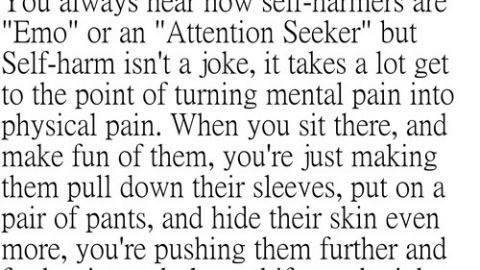This is a letter to anyone who has lived a life thus far that they deeply hate and regret, and watched their lives crumble around them, only to become victim to a system of hopeless thinking of which they cannot escape. I hope to offer a few of the small discoveries I have made over the past few months.
The depressed mind is a stubborn one. It is an entity which thrives in its own logic and rigid beliefs. When a depressed person seeks help, they often turn to close friends and family first. What these friends and family may not understand is that the depressed brain does not function like a healthy one.
The depressed brain is one of insight; it takes into account all the experiences its had, and makes predictions of the future based on them. For example, someone who was abandoned by a parent as a child may feel that they will never be loved and that everyone they become close to will abandon them too. Or, as another example, someone who has had a difficult past may believe that life will always be harsh and unfulfilling.
There are a couple of techniques that I am trying to use to heal my brain and ‘reset’ it into a healthier state.
Rumination and Reminders
The first is an understanding that things have been bad. Yes, the events of your past were bad. They were difficult, possibly avoidable, and maybe unnecessary. Many people offer empty platitudes that they pass off as ‘help’, in the form of “Be grateful for what you have” or “You can learn from your mistakes” or “Happiness is a choice”. Unfortunately these people have either never done things that are truly regrettable, or simply lack the insight and intellect to ponder deep enough about their actions.
When your past has been bad, it can be helpful to stop engaging with the ruminating thoughts. I have been meditating regularly, and the key behind mindful meditation is the concept of presence and allowing thoughts to pass. Although the thoughts will come, and you will feel ashamed, angry, regretful, or deeply sad at the memory of past events, you do not have to fall into the spiral of negative thinking which ensues.
Negative thinking, at least for me, starts like this:
- Trigger
- I see, hear, or remember something that triggers a negative thought
- “That person is doing much better than me in life”
- First Link
- I link that memory to a negative generalization about myself
- “I have made a poor series of decisions which led to a failure of a life”
- Labeling
- I label myself with a static trait based on the generalization
- “I am a loser”
- Repeat from Step 2 with another generalization, possibly about the future
- “I will never get my life together, and I’ll always be a loser”
The problem with this type of thinking is that it is dreadfully logical to the depressed brain. No amount of ‘positive thinking’ will change these convictions because they are anchored in pathways of causation (A leads to B, which leads to C). The only immediate relief the depressed person can find is by breaking the first link in the chain.
The technique I use is ‘cancelling’, which involves catching yourself in the spiral, and saying “Cancel, Cancel, Cancel” in your head to at least stop the progression. Following the example given, when I see someone doing better than me I compare them with myself. Once I start thinking “I have made a poor series of de-“, and I stop there. “Cancel, Cancel, Cancel” I say, until the thought passes, and I immediately and mindfully return to whatever I was doing before. Of course, this technique works best when you reduce the amount of triggers in your surroundings. If that means deleting all your social media or cutting contact with toxic individuals in your life, then so be it.
The idea I would like to convey in this point is that while we may not be able to forgive ourselves for who we are or what we have done, we do not have to be reminded of our sins and flaws every five minutes.
Neutrality, Not Positivity
Some people may suggest to replace these negative thoughts with positive ones, but that is not always possible. For example, someone who has been incarcerated, served their time, and have been released may feel deep shame for their criminal record. They can sit and count their blessings, but that does not conceal their afflictions. No matter what they do, they will always be a former convict and it will haunt them forever. No amount of your forced, synthetic ‘positive thinking’ will ever change that, no matter how hard who you close your eyes and ‘believe’.
A thought process I have found to be more effective is one that was taught to me by my therapist. She said that in order to fight the black and white thinking, we must first move to the grey. For someone to start climbing, they must first stop falling. Neutrality is the terminal from which you take your connecting flight to true, natural positive thinking. We can do so by using neutral affirmations, in contrast to positive ones.
Positive affirmations attempt to make the depressed brain believe something that counters its ingrained and deeply embedded logical pathways. “But you’re a smart, talented person”, they say. What if I’m not? What if my poor choices prove that I am stupid, and I have less talent than a bowling ball? The positive affirmations do not work because they are ridiculously unfounded. There is no evidence to support the premise that this person is “smart” or “talented” or “strong” or whatever you want to come up with.
Positive affirmations can lead to inner conflict in those with low self esteem. The affirmation “I am a beautiful person” is challenged by the thought “But I am not physically attractive”. The affirmation “I am improving day by day” is challenged by the thought “I have gotten worse over the past few weeks”.
To move into the grey, we can use neutral affirmations which play the depressed brain’s own game of logic. The strongest weapon against depressive thinking is logical thinking. Affirmations that give the user power are highly effective. One of the most powerful affirmations I have heard is one that came from the wise Douglas Bloch, a depression counselor who repeated to himself, “I have the ability to create support for myself in my life”. The power of this affirmation is in its undeniable truth. It cannot be refuted that we have the power to ask for help, and that is not something that needs to be ‘believed’. It is true whether we like it or not. We DO have the power to summon aid when we are in a time of desperate need. There are friends, family, therapists, strangers online willing to listen.
I have my own key affirmation that I will share in another blog post. Here are some examples of neutral affirmations that you can draw inspiration from:
- It is human to err, and I am only human after all
- My worth is in many things, and not only in my appearance, achievements, or social reputation
- I have the power to make small, accruing gains to lead to long term success
- I have the power to make better choices today
To recap, the two concepts are to reduce the degree of negative thinking with canceling, and to shift thinking into a neutral state. Note that negative thoughts cannot be stopped from entering your mind, but you can choose to not engage with them. Also note that these techniques must be practiced, as in repeated to gain and maintain their benefits.
I hope this helps even if it only offers a passing moment of relief, a small spark of hope.




